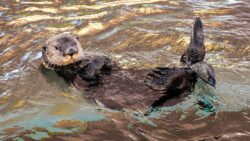
How to say sea otter in Spanish?
Sea otters are adorable animals that can be found in coastal areas of the Pacific Ocean. If you’re looking to learn how to say “sea otter” in Spanish, the word is “nutria marina”.
“Nutria” is a term that refers to the otter family, and “marina” means “of the sea”. So when combined, “nutria marina” translates to “sea otter”.
It’s important to note that there are different species of otters that live in different regions around the world. In Spanish, the term “nutria” can be used to refer to other species of otters as well, such as the European otter (nutria europea) or the river otter (nutria de río).
If you’re interested in learning more about sea otters, there are many resources available online and in books that can provide you with information about their habitats, behaviors, and conservation efforts. Additionally, you can watch videos or documentaries about sea otters to see these adorable animals in action.
Overall, learning how to say “sea otter” in Spanish is a fun way to expand your vocabulary and learn more about the natural world. Whether you’re a language learner or simply interested in animals, taking the time to explore the world around you can be a rewarding and enriching experience.
Sentences with the term sea otter in Spanish
| La nutria de mar es una especie de mamífero. | – | The sea otter is a species of mammal. |
| ¿Sabías que la nutria de mar es carnívora? | – | Did you know that the sea otter is carnivorous? |
| La nutria de mar es la única especie del género AdeEnhydra. | – | The sea otter is the only species in the genus AdeEnhydra. |
| La nutria de mar pueden pesar hasta 50 kilos. | – | The sea otter can weigh up to 50 kilos. |
| ¿Qué me puedes contar de la nutria de mar? | – | What can you tell me about the sea otter? |
| Puedo decir que la nutria de mar tiene un pelaje muy grueso. | – | I can tell that the sea otter has very thick fur. |
| Aunque sale a tierra, la nutria de mar vive más tiempo en el agua. | – | Although it comes out on land, the sea otter lives longer in the water. |
| El alimento de la nutria de mar es variado. | – | The food of the sea otter is varied. |
| El erizo de mar es un buen manjar para la nutria de mar. | – | The sea urchin is a good delicacy for the sea otter. |
| La nutria de mar es una excelente cazadora. | – | The sea otter is an excellent hunter. |
| ¿Sabías que la nutria de mar usa herramientas para cazar? | – | Did you know that the sea otter uses tools to hunt? |
| Para comer un erizo de mar, la nutria de mar usa piedras (por ejemplo). | – | To eat a sea urchin, the sea otter uses stones (for example). |
| Además la nutria de mar come algunos peces. | – | Also the sea otter eats some fish. |
| Se reconocen tres subespecies de la nutria de mar. | – | Three subspecies of the sea otter are recognized. |
| Para vivir en el mar la nutria de mar posee varias adaptaciones. | – | To live in the sea the sea otter has several adaptations. |
| Normalmente la nutria de mar se desplaza por el dia. | – | Normally the sea otter moves around during the day. |
| Normalmente la nutria de mar pasa un largo período aseándose. | – | Normally the sea otter spends a long period of time grooming itself. |
| La nutria de mar es poligínica. | – | The sea otter is polygynous. |
| El apareamiento de la nutria de mar puede tornarse violento. | – | Sea otter mating can turn violent. |
| Los nacimientos de la nutria de mar ocurren durante todo el año. | – | Sea otter births occur throughout the year. |
| Las nutrias de mar hembra alcanzan su madurez sexual a los 3 ó 4 años. | – | Female sea otters reach sexual maturity at 3 to 4 years. |
| Las aguas donde viven las nutrias de mar tienen una profundidad de más de 15 metros. | – | The waters where sea otters live are more than 15 meters deep. |
| La piel de la nutria de mar es muy codiciada. | – | The fur of the sea otter is highly coveted. |
| Actualmente la mayor parte de la población de la nutria de mar habita en Rusia. | – | Currently most of the population of the sea otter lives in Russia. |
| No me gustaría encontrarme con una nutria de mar. | – | I wouldn’t want to run into a sea otter. |
| Buscar una nutria de mar para estudiarla debe ser engorroso. | – | Searching for a sea otter to study must be cumbersome. |
| ¿A qué sabrá la carne de nutria de mar? | – | What will sea otter meat taste like? |
| ¡Me gustaría comprar una piel de nutria de mar! | – | I would like to buy a sea otter skin! |
| ¿Qué se puede hacer con la piel de la nutria de mar? | – | What can be done with the skin of the sea otter? |
| ¿Irías conmigo a cenar nutria de mar? | – | Would you go with me to dinner sea otter? |